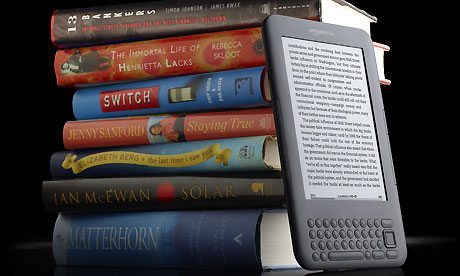Tete a tete: Are print books becoming obsolete?
[dropcap]P[/dropcap]rint books – outdated and soon to become extinct, or a permanent part of our culture? Two Books writers go head to head.
“The future is clear – a single shiny e-book that can transport you with ease through your fortnight of rest and relaxation on some faraway sun-kissed isle?”
 Once a staunch believer in the power of page-turning and the beauty of physical books, I find myself wondering why we ever put up with those archaic, smelly, and heavy lumps of paper which clutter up our otherwise spotless houses (honestly, my house is spotless, I promise).
Once a staunch believer in the power of page-turning and the beauty of physical books, I find myself wondering why we ever put up with those archaic, smelly, and heavy lumps of paper which clutter up our otherwise spotless houses (honestly, my house is spotless, I promise).
In an average two-week beach holiday, it’s foreseeable that an avid reader could devour around ten books: more if it’s a bit of chick-lit and potentially less if classics like War and Peace. With the extremely stringent hand luggage rules on flights and the excessive charges for hold luggage, ten books could easily take up the space of one small suitcase, leaving you with a bit of a dilemma: clothes, or books?
Since the invention of the e-book, this dilemma has dissipated, so that we’re now able to cram all of the Bleak Houses, Game of Thrones and countless Shades of Grey into one tiny rectangular package that could easily fit into the front pocket of a suitcase. You could take ten to the power of ten books, and your suitcase wouldn’t be the slightest bit heavier than having just the one.
So if this is the case, I ask you this: why be encumbered with the crinkled leaves of slaughtered trees bound in their pretentious uselessness by the glue of nostalgia and reminiscences?
[pullquote style=”left” quote=”dark”]Why advertise what you’re reading?[/pullquote] And here’s the added bonus: while the fad of Fifty Shades of Grey seems to have died down, the number of repressed housewives probably hasn’t, and you can read whatever you want on an e-book without the judgements and prying eyes of onlookers. Shouldn’t what you’re reading be a private matter between yourself and words on the screen?
Sitting at a desk with a book in your right hand and a dictionary in your left is far from ideal, but with an e-book the dictionary is built-in, which saves time, effort, and general faff. There certainly isn’t a search function in a 500-page edition of Mansfield Park when you desperately need that one particular quote to perfect your essay.
A Huffington Post/YouGov poll last year asking about the reading habits of 1000 adults in the US found that 41% of them hadn’t read a fiction book in the past year. While this focused on an American audience, we would probably find something similar in this country, since our rushed lives and television-centred world have led to a desire for easy entertainment.
With this being the case, for those of us to whom literature and the power of reading really matter, we need to be working towards making reading a more accessible medium, and e-books have done this. They are attractive, stream-lined, can function as tablets, don’t take up space on bookshelves, and don’t hurt the environment as much as, say, a hundred books would.
As a literature student in cramped digs with eighty books a year to read plus secondary reading, there’s simply not space for all of it. At £8 a book, it’s not even affordable. I take the module Nineteenth Century English Novel, and most of the books I need to read for this are available on Kindle for free as part of the Gutenberg Project (which aims at making the Classics more widely available and read). In this way, my Kindle saves me space and potentially hundreds of pounds, so it’s invaluable for that reason. It’s also meant that hundreds of people have read some great classic literature based on the passing thought of, “It’s free, why not?”
Here’s my final thought: the rise of e-books has meant that aspiring writers are able to publish their own books if persistently refused by tyrannical publishing companies. This is a great opportunity for struggling writers, and I’ll leave you with the thought that publishing companies have, in the past, turned down the likes of The Lord of the Flies, Catch-22, Animal Farm, and even Harry Potter and the Philosopher’s Stone. That may never have to happen again.
Samantha Hopps
[divider]
“There is not a lot that differentiates the robotic navigation through an e-book from the mindless scrolling through Facebook on an iPad.”
 In a modern world obsessed with convenience, will the affordability and ease of accessibility found in the e-book make print books an endangered species? Many compare it with the decline of the record in favour of digitised music; now the record is largely confined to a dwindling number of record stores and the odd hipster-esque vintage shop. Although this may well happen to books one day in the future, it is my opinion that printed books are not about to go down in the history (e-)books as a quaint aspect of a bygone era.
In a modern world obsessed with convenience, will the affordability and ease of accessibility found in the e-book make print books an endangered species? Many compare it with the decline of the record in favour of digitised music; now the record is largely confined to a dwindling number of record stores and the odd hipster-esque vintage shop. Although this may well happen to books one day in the future, it is my opinion that printed books are not about to go down in the history (e-)books as a quaint aspect of a bygone era.
Firstly, although hardback book sales have been surpassed by e-books at a rate of 3 to 1 on Amazon, paperback sales have actually increased since 2011. Unlike hardback books, paperbacks are relatively inexpensive, with many costing the same or less than an average e-book. Although you can download free e-books, in my experience these are often poorly duplicated, as I found to my distress upon discovering html coding text in the middle of Jane Eyre.
Economy aside, an e-book is just not – in my mind – equal to a physical book. I have a Kobo and appreciate the convenience of being able to carry around a small arsenal of books wherever I go, but the experience of reading them is never as absorbing or gratifying as that of poring through a printed book. E-readers reduce the act of reading to one of passive participation rather than the active and engrossing experience that it should be. They are multi-functional, able to connect to the Internet and therefore also able to distract us with their various beeps and buzzes.
[pullquote style=”right” quote=”dark”]They cannot be lent, unearthed as a gem in a second hand book shop or written in.[/pullquote] Conversely, hardcopy books provide a tactile and engaging approach to reading which, as well as being easier on the eyesight, has been shown by studies to be far superior for cognitive remembrance. There’s just something about the feel of turning the pages of a book and that glorious smell of musty old pages which harnesses all of the senses and makes for a deeply satisfying experience. Furthermore, the material of the pages alongside the binding and texture of the front cover all communicate the value, age and uniqueness of the book. E-books, however, remain as unblemished and homogenous as the day they were converted.
Their pages cannot become dog eared as a result of repeated reading and there will be no rare first or special editions to collect. They cannot be owned in the same concrete sense as printed books (as many readers found to their dismay when Amazon deleted several editions of Orwell’s 1984 and Animal Farm off their Kindle’s in 2009 without warning). In short, e-books are devoid of the personality of regular books and have a tendency to reduce the act of reading to just words.
Although the popularity of e-books is increasing, I believe there will be a lot of people like me who will still be able to recall the value of print over pixels, at least for the next hundred years. As a result, I don’t think we will be turning a new page in the history of books any time soon.
Lizzie Vallen
[divider]
Are you a Kindle convert or a paperback purist?
Have your say @boarbooks

Comments (2)